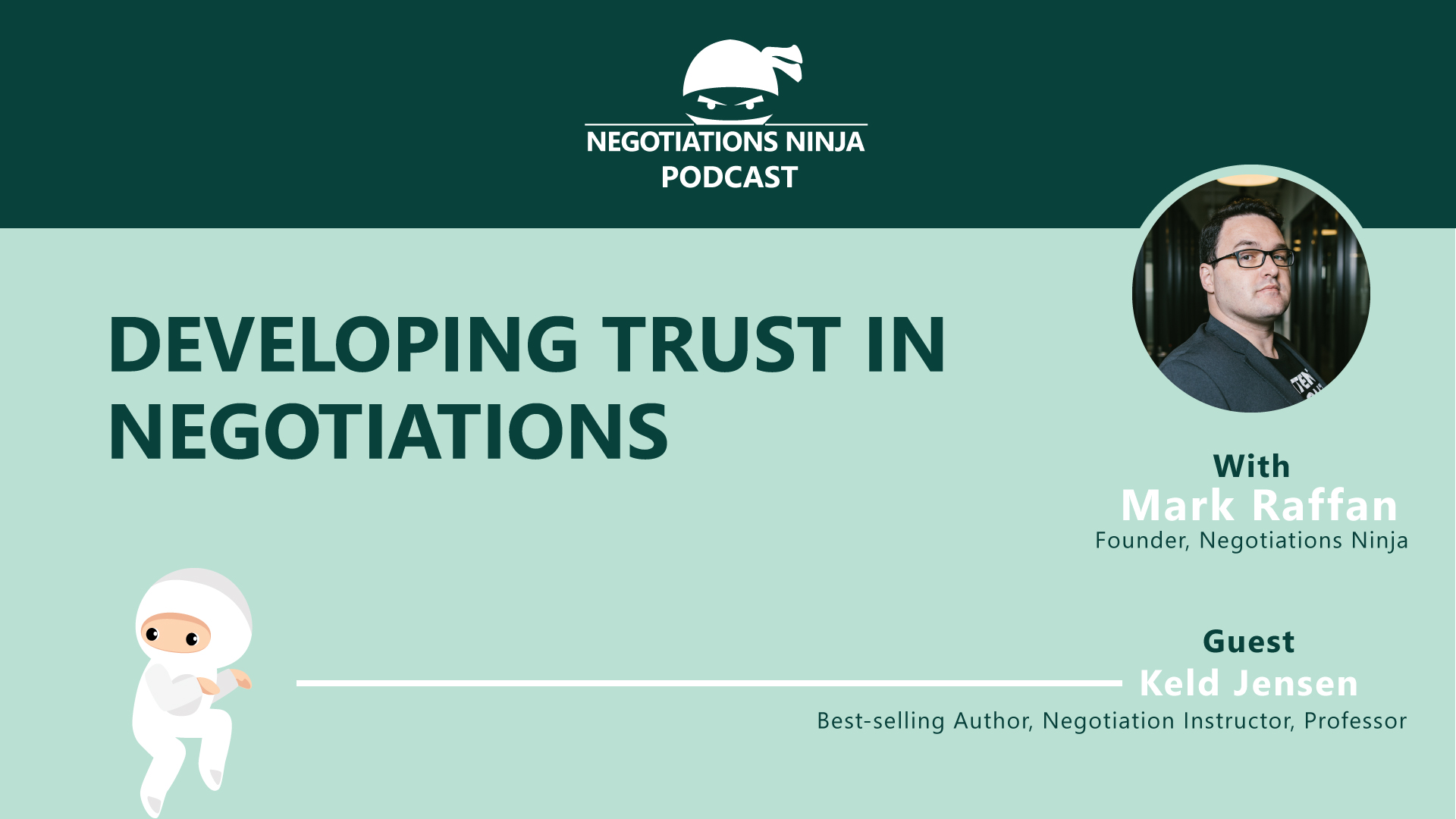Negotiation is a psychological game between individuals. To play it effectively, you have to know the rules of the game, right? What role does trust play in the big game? How do we develop trust? What are the essential components within trust that we need to be aware of? Why is it so important to verbalize trust? Keld Jensen—adviser, professor, speaker, and author of Honest Negotiation—joins us in this episode of Negotiations Ninja to talk about trust.
We’re also chatting about why trust in negotiations isn’t just for procurement and sales experts. It’s for anyone who negotiates or develops relationships in their professional and personal lives. From understanding how global levels of trust change over time to parents negotiating with their kids—this discussion goes deep on trust, relationships, transparency and negotiations.
Outline of This Episode
- [2:12] Who is Keld Jensen?
- [3:46] Why is trust so important?
- [5:06] The monetary value of trust
- [9:17] How to develop trust quickly
- [15:54] What to do if trust is lost
- [23:02] Negotiate how to negotiate
- [28:16] How to improve trust skills
- [32:45] How to learn more about Keld Jensen
The value of trust
Why is oxygen important to survive? Can you negotiate in a world without trust? Yes—it’s called zero-sum negotiation. But if you want to move into partnerships or long-term relationships, trust is a requirement. If you have a high level of trust your transactional costs will go down and your profit will increase. Because of this, you can measure the value of trust.
The second you connect trust to profit and success, people wake up. Keld discusses looking at 3,500 negotiations around the world which shows that when trust is present in a negotiation, parties come out much more financially successful versus when parties don’t open up and share information. If you don’t trust someone, you’ll tend to get lawyers and contracting deeply involved. If you have a high level of trust, that’s not necessary. The world is simpler.
Negotiate the negotiation
What happens when one side is playing chess and the other side’s playing poker? Keld believes you need to start by identifying and agreeing on the rules of the game. You have to negotiate how to negotiate. Zero-sum? Partnership? You have to verbalize the rules of the negotiation.
You can test the waters by asking if they’ll be open with you or not. Do you want to be open? What variables do you want to be open about? What don’t you want to share? How do you make sure that you get information back? What are the right questions to ask?
If you both agree on some level to be open about what you’re seeking out of the negotiation, you can move forward with being open. If they’re not interested in a partnership, then you’ll take a different route in your negotiation. If they’re going to take a zero-sum approach, then you certainly don’t want to be as open as you would be with someone you trust.
How to develop trust quickly
Can you develop trust quickly? Trust doesn’t come from words—it comes from actions. If you start verbalizing and talking about trust you can help the birth of trust. Keld also recommends discussing how you’ll exchange information. If you exchange value in the negotiation, you slowly build trust. You have proven that you’re willing and happy to exchange information.
What about gut feelings? What if you immediately don’t like someone? Or they don’t like you? It’s hard to get past that initial feeling. Listen to hear Keld’s thoughts on the topic.
What to do if trust is lost
Trust is a key issue in the world. World leaders recognize and acknowledge that trust is an issue. Keld has felt that a lot of professional negotiators don’t think about trust. It is either part of the negotiation or it isn’t.
But you have to try and create trust. Keld may do something to open up and share. If one side is perceived to be open and honest, the counterpart can mirror that behavior. But if you step into the negotiation and are closed off, bluffing, or lying you’ll get the same response from your counterpart. If you feel the counterparty is trying to cheat you, you may resolve to cheat them before they cheat you.
If Keld is with a client that he catches cheating or holding back information, he asks them if that’s how they were raised. 99.9% of them would say no. People are taught to be honest. How does all of that teaching go away the moment you step into negotiation?
How do you foster trust-building skills? Listen to the whole episode for Keld’s take on learning to recognize trust.
Resources & People Mentioned
- Honest Negotiation by Keld Jensen
Connect with Keld Jensen
Episode Sponsor
- 2019 SCMA Conference and Awards Gala – 100 Year Celebration
- Discount Code: scma podcast
Connect With Mark
- Follow Negotiations Ninja on Twitter: @NegotiationPod
- Connect with Mark on LinkedIn
- Follow Negotiations Ninja on LinkedIn
- Connect on Instagram: @NegotiationPod




